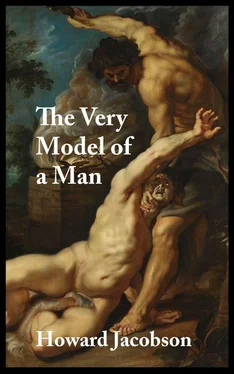It is partly the idea of brotherhood, of brotherliness, of blood relation, that keeps us so reserved with each other. I believe we both recoil from something demeaning in the connection. It isn’t personal. We wouldn’t rather have other brothers. Or sisters, come to that. We have no quarrel with the particulars; it is the principle that makes us uneasy. The business of having to be blood-related to anybody at all. What, at the last, is there to say to a brother, when what lies at the bottom of your connection is a labyrinth of pipes and tubes, eggs, sperm, smegma, phlegm?
My father cried out in the night for brothers. The fragments of refracted light that were his soul lay iced up in his chest. He feared he had not been adequately animated. He had missed the experience of birth. But I sometimes envied him his pristine origins, his unrelatedness, his clean start.
I was luckier than Abel. I named things to make them mine. By naming them I took a hand in their origination and commanded them to begin again in my mind. In this way I was at least associated with a sort of purity and could new-create the objects of my observation, even if I couldn’t new-create myself. I also possessed the other invaluable advantage of being able to vent my spleen. I attacked the earth. I drove weapons into the soil. I hacked at limbs and branches. I changed the colour and disposition of the vegetation. I warped its character. I broke its spirit. I made it bleed.
My brother did not have it in him to cleanse his way. He never thought to seek redress. He absented himself, tried not to notice — that was enough. But you start noticing, willy-nilly, the moment you begin to speak. Words have ears. They have a past life, a keen retentive memory. So he kept quiet. He learnt to make music out of grass, and came to enjoy the company of sheep.
He went for long walks with them, not looking where he was going, as though he half meant to walk himself off the earth altogether. Later, the Lord would come to regard this as reverence. Quietude has this effect on gods. They mistake it for worship, whereas nine times out of ten it is actually horror.
It was my theory that our distaste for what bonded us physically ended up bonding us spiritually. We were as one, I thought, in our abhorrence of what made us one. I took this to include, not our parents exactly — for they too leapt from what was incontrovertibly fleshly and familial — but anything overtly referential: birthdays, anniversaries, festive proclamations of our periodicity and connectedness. So I was surprised when he came to my garden in his eleventh year or thereabouts — I am not saying that I was unaware of time, only that I didn’t intend to mark it — and asked me to gather him a nosegay.
I wondered what his reason was. Had he fallen in love with one of his sheep?
He raised his eyes, let me see their wandering light, then lowered them. He presented his throat. Flashed me a smile. Made much of his teeth. Quite a show. Told me he loved all his sheep equally and wouldn’t dream of upsetting the others by singling out one.
Banter. Brotherly banter.
I have always been convinced that I amused him. That I could make him laugh, or at least smile, almost at will. I prided myself on this while he was alive, and even afterwards found consolation in the thought that I had at least lightened life for him, cheered him out of his silences, invigorated him and… and thereby earned his love. Only recently has it occurred to me that he might not have found me in the least funny. Might not have congratulated himself on his good fortune in having a brother who was so diverting. Might not have loved me for my probes and sallies. Might not have thought I was clever. Might not have wanted to be me as often as I wanted to be him. Might not have been smiling in all the instances when I took it for granted he was smiling. But might have been snarling instead. Showing me his teeth in the way a wild and frightened animal shows his teeth, not in the way I fancied that a doting younger brother does.
Maybe that wasn’t a joke, then, his rejoinder to my joke. And maybe he was right and my joke wasn’t a joke either.
But now is now and then was then. I told him I could put together a bouquet big enough to please his entire flock. Provided they liked the colour red.
He thanked me — it looked like a smile; I close my eyes and I still see a smile — but no, no, my generosity would be wasted. He knew his sheep, and all they would do with my flowers was eat them.
Probably just as well, I said — keeping it up, keeping it up — given the condition of the blooms I was meaning to off-load.
And now perhaps I do see rings of tiredness round his eyes. And the colour vanishing from his face, as it used to do when I pinched him hard, surreptitiously, and would not release him, or fired a fusillade of punches on him, one blow succeeding another, one punch becoming weightier than the last, first on this shoulder, then on that, then on his chest, an endless battery of flat punches, like someone hammering at a door that wouldn’t open… And he would sway, and the light would go out in him, his beauty would die there and then before me, and were I not to hold him, to take his dead weight, to put my arms around him, he would fall…
Was this not a strange reaction to a joke? A joke?
He was a fainter, my brother. Not a holy fainter of the kind that is preserved as a national treasure in your country, one who espies the godhead in artefacts and buckles before their radiance, a passer-out on aesthetic principle, a collapser in the service of the sublime. Abel’s susceptibilities were less specifically targeted. It was life itself he was sensitive to. And any sudden strong experience of it could be sufficient to lay him out.
Your brother is exquisitely attuned, my mother once said to me. It is your job to watch over him.
Because I am not exquisitely attuned?
Because you have more resources.
You make that sound like a disparagement. Are resources things to be ashamed of?
Yes, if you do not properly employ them.
In the service of my brother?
In the protection of your brother.
I didn’t say I felt so protective towards him that I sometimes feared for the balance of my mind. I didn’t refer to the black nights I watched pale into sickly dawn, counting time by the ticking of his heart, my ear moth-fluttering above his chest. I didn’t mention that it was enough merely to see him, some days, in an attitude of abstraction, or deep in concentration on a matter of small moment — his lips compressed, his brow taut — for a scouring terror to descend on me, a purgative melancholy such as I had never known (outside what I knew of it in relation to him), whose mission was not completed until it had hollowed me even unto my bones. I didn’t say anything. Why argue? Against charges which are so savagely unfair you do not bother to defend yourself. It is only the small injustices you go to war over. The grand misrepresentations you fight in your heart.
But what did my fainting baby brother want those flowers for?
A gift.
I must have looked up from what I was doing — cross-pollinating, as I remember; double-cross-pollinating — because I know that I registered his hands. Which ever so slightly were trembling. And which ever so slightly were dirty, from the fleece of sheep.
I weep today, for those fleece-stained hands.
A gift? Flowers? A gift of flowers, I asked, for whom?
For my mother.
(He called her my mother. I called her my mother. Never once did we think of using the word our. Or dropping the possessive altogether.)
Why did he want flowers for my mother?
I always give my mother flowers on this day.
This day? How was this day any different from all the others?
Читать дальше











